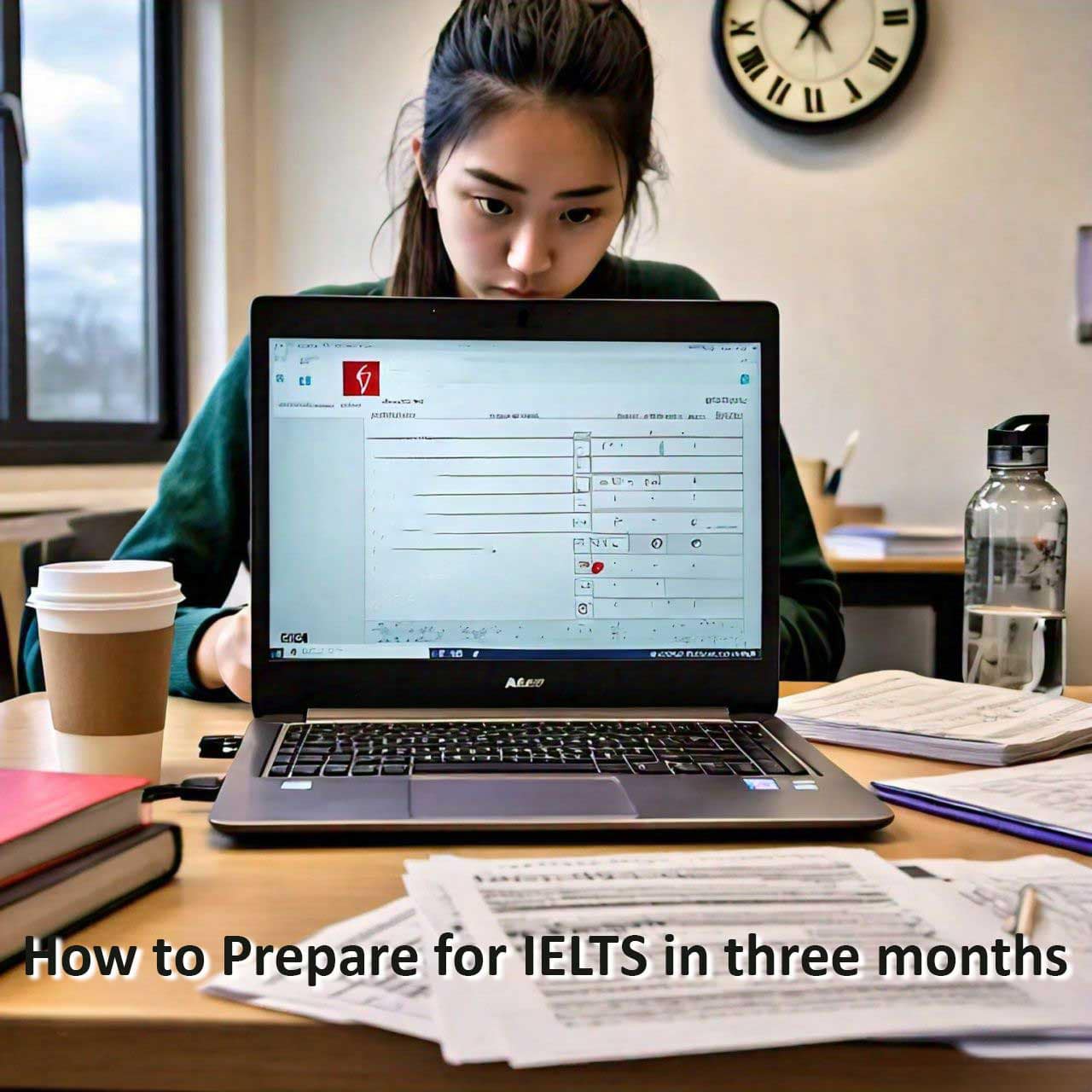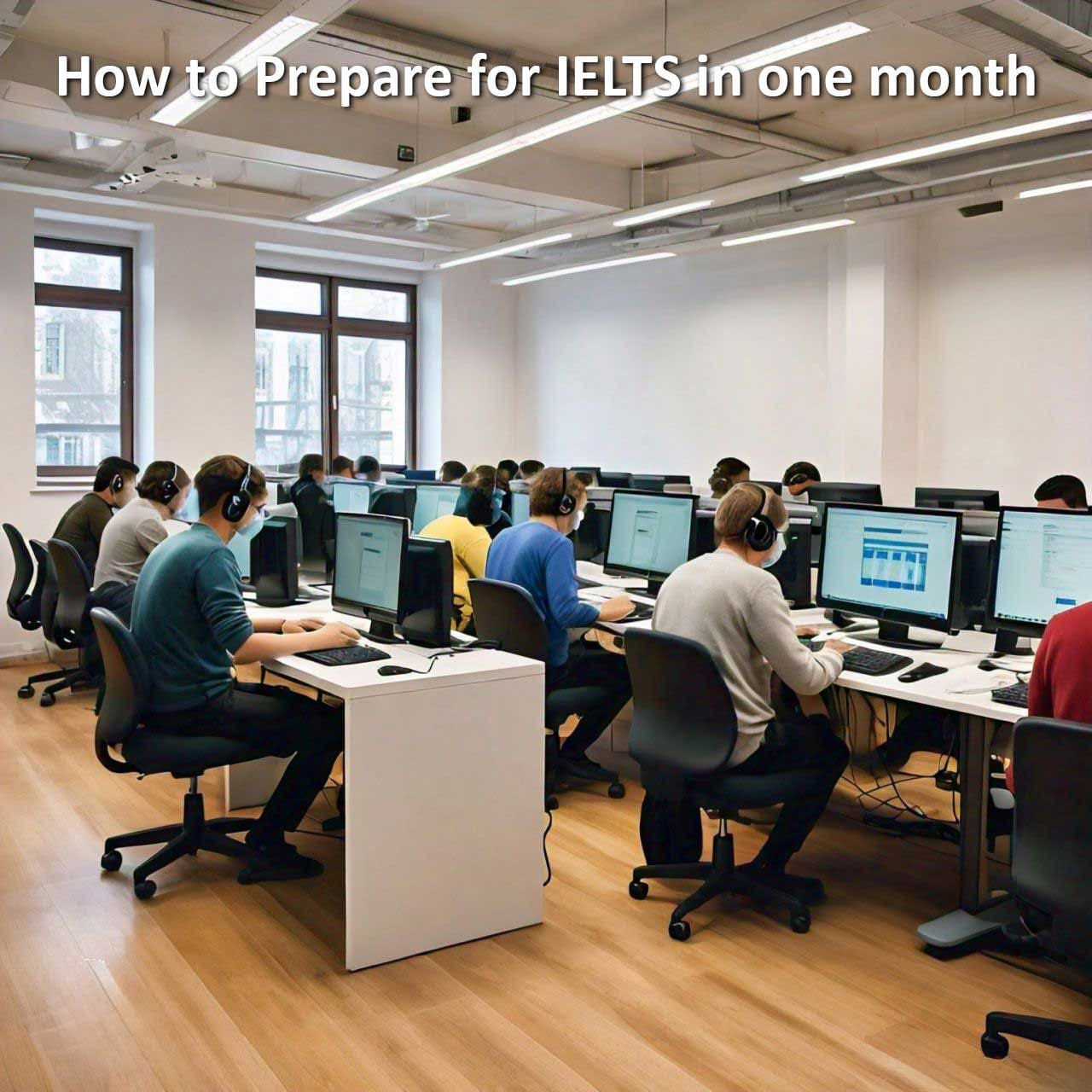Preparing for the IELTS exam in three months is an ideal timeframe to build your skills, understand the test format, and practice thoroughly. Whether you’re aiming for academic success or meeting immigration requirements, this guide will provide a structured plan to prepare for IELTS in three months and achieve your desired band score.
Table of Contents

Month 1: Build a Strong Foundation
The first month is all about understanding the IELTS test format and improving your basic English skills in your IELTS in three months plan.
1.1 Familiarize Yourself with the IELTS Format
Before diving into preparation, get a clear idea of the test structure:
- Listening: Four sections, 40 questions, 30 minutes.
- Reading: Three passages, 40 questions, 60 minutes.
- Writing: Two tasks, 60 minutes.
- Speaking: Three parts, 11–14 minutes.
Make sure you know whether you’re taking the Academic or General Training version of the test.
1.2 Assess Your Current Skill Level
Take a diagnostic test to identify your strengths and weaknesses. Use official resources like IELTS.org or British Council for mock tests.
1.3 Strengthen Core English Skills
- Listening: Start listening to podcasts, news channels (BBC, NPR), and TED Talks to improve your comprehension of different accents.
- Reading: Read articles, newspapers, and books on IELTS-relevant topics like technology, health, and education.
- Writing: Focus on basic grammar, sentence structure, and vocabulary.
- Speaking: Begin practicing simple conversations to gain confidence in speaking English fluently.
1.4 Set Up a Study Schedule
Allocate time for each section every week. Example schedule:
- Listening: 1 hour/day, 5 days/week.
- Reading: 1 hour/day, 4 days/week.
- Writing: 1-2 hours/day, 4 days/week.
- Speaking: 30 minutes/day, 5 days/week.
Month 2: Focused Practice and Skill Development
Now that you understand the basics, it’s time to practice each section in detail in your IELTS in three months plan.
2.1 Improve Listening Skills
- Practice Daily: Use official IELTS listening tests.
- Take Notes: While listening, jot down key ideas to enhance focus.
- Work on Weak Areas: For instance, if you struggle with multiple-choice questions, practice them repeatedly.
Example: During a test, you might hear a conversation about travel plans. Focus on keywords like dates, prices, and locations to answer accurately.
2.2 Master Reading Techniques
- Skimming and Scanning: Learn to quickly identify main ideas and locate specific information.
- Practice IELTS Question Types:
- True/False/Not Given
- Matching Headings
- Sentence Completion
- Time Management: Aim to spend 20 minutes per passage.
Example: For a passage about climate change, keywords like “global warming” and “carbon emissions” can help you locate answers faster.
2.3 Enhance Writing Skills
- Task 1 (Academic): Focus on describing graphs, charts, and processes.
- Task 1 (General Training): Practice writing formal and informal letters.
- Task 2: Write essays on common IELTS topics like education, environment, and health.
Example Essay Topic:
“Some people believe online education is more effective than traditional classroom learning. To what extent do you agree or disagree?”
Tips:
- Spend 5 minutes planning your essay.
- Use linking words like “however,” “in addition,” and “on the other hand.”
2.4 Practice Speaking Daily
- Part 1: Practice answering personal questions. Example:
“What is your favorite type of food, and why?” - Part 2: Practice giving 2-minute speeches using cue cards. Example:
“Describe a skill you would like to learn.” - Part 3: Discuss abstract topics. Example:
“What role does technology play in education?”
Month 3: Mock Tests and Advanced Strategies
The final month in your IELTS in three months plan is all about applying what you’ve learned through full-length tests and fine-tuning your performance.
3.1 Take Weekly Full-Length Mock Tests
- Simulate test conditions by sitting for the test in one go.
- Use official practice tests from IELTS.org or Cambridge English.
- Analyze mistakes after each test to target weak areas.
3.2 Improve Time Management
- Use a timer for each section during practice sessions.
- Allocate time effectively during the test:
- Listening: Focus on transferring answers accurately in the 10-minute window.
- Reading: Spend no more than 20 minutes per passage.
- Writing: Allocate 40 minutes for Task 2 and 20 minutes for Task 1.
3.3 Refine Speaking Skills
- Practice with a tutor or language partner on platforms like iTalki.
- Focus on fluency, pronunciation, and coherence.
- Avoid memorized answers—speak naturally.
3.4 Review Common Mistakes
- For Writing, avoid grammatical errors and ensure your essay has a clear structure.
- In Reading, double-check spelling and answer sheet entries.
Success Stories: IELTS in Three Months
Case Study 1: Maria from Brazil
Maria needed a 7.0 for a study abroad program. Over three months, she practiced for two hours daily, focusing on Writing and Speaking. By her test date, she felt confident and scored a 7.5, exceeding her expectations.
Case Study 2: Ahmed from Pakistan
Ahmed struggled with Listening but excelled in Reading. He spent three months balancing his preparation, using online resources and mock tests. On test day, he achieved an 8.0 overall.
Top Resources for IELTS Preparation
- Official Websites:
- Books:
- Cambridge IELTS Practice Tests Series.
- “Barron’s IELTS Superpack.”
- Apps:
- British Council’s IELTS Prep App.
- Cambridge English’s IELTS Practice App.
- Online Platforms:
- Magoosh IELTS.
- IELTS Liz.
Conclusion
Preparing for IELTS in three months gives you ample time to build your skills and confidence. By following this structured plan, practicing consistently, and using high-quality resources, you can achieve your desired band score.
Remember, success in IELTS is all about consistency and smart preparation. Start today, stay disciplined, and take one step closer to achieving your dreams!
Finally, if you’re running short of time, then you may want to read our guide on preparing IELTS in One Month, or even lesser at Preparing IELTS in two weeks.



